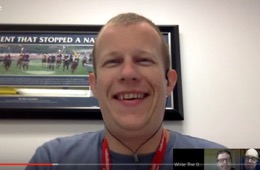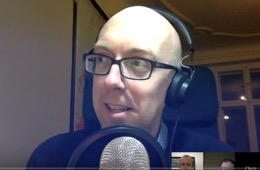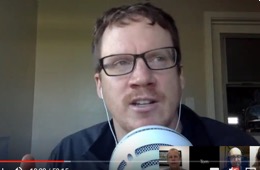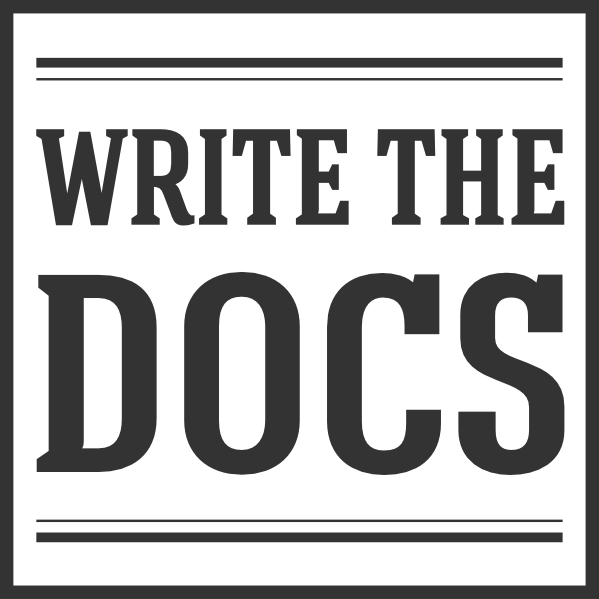WTD Episode 27: Starting a doc group/process when you're the first
- Recorded Feb 20, 2020
- Length: 57:43
- Download MP3
Hosts for this show

Amy Qualls

Cynthia Ng

Jared Morgan

Chris Ward

Tom Johnson
Transcript
The following is a machine-generated transcript of the podcast. Expect inaccuracies and typos from the actual speech.
[00:00:00] Jared: [00:00:00] Hello folks, and welcome to write the docs episode. Wow. What are we up to now? Geez, it’s like 28 or something, isn’t it guys? It’s like, I can’t believe how many we’ve like besides the 16 yeah, no, it’s, it’s not quite that, and I know it’s, it’s, we’re getting up there and emphasize now, and we’ve been doing this for a nearly.
[00:00:26] Two or three years now, which is kind of crazy to think that 70 people have joined us on the show to debate. Anyhow, I digress, which is what I normally do at five 30 in the morning. Um, I’m Jared Morgan. I’m a technical writer at, um, um. Company here in Brisbane called squiz, and, uh, and, uh, it’s, it’s actually quite a fun game at the moment.
[00:00:49] Um, and, uh, yeah, it’s, uh, I’m never short of work, so that’s very good. It’s good. Good problem to have if you’re a technical writer. But, uh, it’s not just me on this show today. I’m joined with [00:01:00] the. A myriad of other people on the show, including our regulars. So let’s introduce them and see how they’re going.
[00:01:08] Uh, this time round, we’ll start with, uh, Tom Johnson in the U S hello Tom. How are you? [00:01:14] Tom: [00:01:14] I’m going very well. Yeah.
[00:01:17] Amy: [00:01:17] You notice, uh,
[00:01:18] Tom: [00:01:18] Jared, there’s, um, there’s kind of an idiom that I, you often say that, uh, was kind, kinda fun. When you say how, how are you going? It’s kind of an Australia thing, I think. Right?
[00:01:28] Jared: [00:01:28] It’s, it’s very much, Hey, how you going?
[00:01:30] Yeah. Yeah. We also do people often,
[00:01:34] Tom: [00:01:34] do people in Australia often respond like I’m going well or, or do they not say that.
[00:01:40] Jared: [00:01:40] Oh, the often it’s, yeah. Oh, yeah, yeah. All right, mate. Or whatever, you know? Yeah. It’s a bit like, um, have you eaten in some countries? You know, they say that, yeah. Yeah.
[00:01:52] Tom: [00:01:52] Uh, it’s, it’s going great here.
[00:01:53] We have a three day weekend, so looking forward to, uh, doing my taxes and other fun stuff, so.
[00:02:00] [00:02:00] Jared: [00:02:00] Right. That sounds, uh, fun.
[00:02:07] How about you, Chris ? They, Chris over in Berlin
[00:02:10] Chris: [00:02:10] at the moment, currently in Manchester in the UK.
[00:02:14] Jared: [00:02:14] Ah. Just
[00:02:16] Chris: [00:02:16] we were visiting for fun basically. Although I’m actually meeting the person who organizes the Manchester meetup tech up on Tuesday. So a little bit of connection there.
[00:02:27] Jared: [00:02:27] So,
[00:02:28] Chris: [00:02:28] and I’m, I worked for a few different people, but I’m actually about to embark on a short period of fun employment semi intentionally.
[00:02:36] So watch this space cause there’ll will awesome lots of things
[00:02:39] Jared: [00:02:39] emerging. Oh, very good. Well, I have to follow you on the Twitters. Where can we find you on Twitter, by the way, for those people who haven’t yet, uh,
[00:02:47] Chris: [00:02:47] Chris judge,
[00:02:49] Jared: [00:02:49] risk change. Very good. All right, we’ll have to check that out. Thanks, Chris. So we are joined today by two folks, both in the U S so I’d like to [00:03:00] introduce them to you.
[00:03:00] That’s that first with Cynthia in how are you, Cynthia?
[00:03:04] Cynthia: [00:03:04] I’m good. Thank you. But a correction is, I mean, Canada, not in the
[00:03:07] Jared: [00:03:07] U S
[00:03:14] I
[00:03:14] Amy: [00:03:14] wondered if you were going to let that pass.
[00:03:19] Cynthia: [00:03:19] No. Self respecting Canadian could ever let pass that they’re in Canada and out of the U S. It’s, um, no, it’s going well. The weather’s actually, uh, been holding out despite being in the Pacific Northwest. Um, I’m actually on Vancouver Island on the very West side. Uh, British Columbia, as we say, beautiful British Columbia.
[00:03:44] Um, I, uh, I’m currently a support engineer at get lab. Um, but our. What’s a bit more relevant today for today’s topic that I’m sure we’ll get into is that I’ve worked [00:04:00] myriad jobs, mostly because there were contracts, but I’ve worked at, uh, Oh, a whole bunch of academic institutions, both university and colleges.
[00:04:10] Um, I’ve worked at. Um, mostly the libraries, public library, but also nonprofits, um, that served, uh, library members. Um, but I’ve also worked in government and, um, basically a lot of public institutions and that sort of thing. I am, do have my master’s of library and information science, so I’m by trade, so to speak, a librarian, um, many of us who are.
[00:04:37] Very avid documentarians, so that’s why I’m here.
[00:04:42] Jared: [00:04:42] Yes, I follow some librarians on Twitter. I know that they are indeed very avid documents hearings. So that’s, that’s very true. Thanks for that. That’s a great intro, Cynthia. Now there’s one other person joining us today and her name is Amy calls. Hello, Amy.
[00:04:56] Amy: [00:04:56] Hello.
[00:04:57] Jared: [00:04:57] Thanks for joining us today. And then tell us a bit about yourself.
[00:05:00] [00:05:00] Amy: [00:05:00] So I am a shiny, shiny, new technical writer at get lab. I have been here for two months. Long enough to still be questioning, what have I done? Why have you made the mistake in hiring me? That sort of thing. I was a, I’ve been a technical writer for another startup before, and while I can’t claim librarian status, I did work at a public library.
[00:05:27] The difference is surprisingly important. To people who have MLSs and MLI SS. And so I try not to cast myself as something that I was not for fear of going down in verbal flames
[00:05:47] Jared: [00:05:47] and also a great introduction. Thank you very much. You’re welcome. That’s great. So there’s definitely a library flavor in today’s show, which is going to be good.
[00:05:56] And the more librarians are better. Um, righto. Let’s get stuck in to today’s subject that now title it, um, a working title of documentarians or it didn’t happen. Uh, because what we know to talk about today is, um, when, um, folks working organizations that don’t have a technical writer and have to sit up an organization.
[00:06:19] Inside the business to start up technical writing from scratch, not necessarily part of their, their job, but they see a need and they do it. And, uh, we’ve actually, we’re lucky enough to be joined by, by Cynthia and Amy, who, you know, probably have a bit of insight into that. So, um, yeah, and this is going to be a very interesting topic and it’s hard sometimes starting off from scratch.
[00:06:43] So I think by the end of this, we should have a few tips and tricks perhaps to. Get around those little hairy edge cases that we might find as we start, uh, a technical writing department, or even a loan writer, technical writing department. So [00:07:00] let’s get stuck in. So, um. As background. I think I might start with, um, with you, Cynthia, cause you, you do have quite a very lot of experience, um, sort of working in, in various places and seeing this native rise.
[00:07:16] So how about you tell us, um, what sort of positions you worked in, um, leading up to the point at which you thought that sitting up a technical writing, um, gig in a organization was important.
[00:07:32] Cynthia: [00:07:32] Yeah. I mean, I do want to preface the fact that like in a lot of these organizations, you’re never, it’s never going to go to the point where there is a dedicated position for technical writing.
[00:07:43] Um, so in, in all of these organizations, I mean, if you. I mean, I’ve worked at a bunch of libraries, but again, also like nonprofits and government, you know, where you, you have a team of people. Um, I usually ended up somewhere [00:08:00] in technology, right? Um, and. Like your, your team is maybe your entire technology team might be like four or five people.
[00:08:09] If you even have an entire team for that, and many small organizations, you’re the only technology or technologist who really does any kind of technology work. So I think what ends up happening is that every time, um, I’ve gone to an organization, I just kind of often saw the need for it because. Uh, you know, as a new person, you’d often ask, okay, well where can I find this information?
[00:08:38] And you know, 90% of the time it was, Oh, go ask that person over there. And especially coming. Um, like it’s, it’s interesting because this is actually at get lab, um, is the first actual tech company that I’ve ever worked at. Um, so all of my experience prior to get lab,
[00:09:00] um, has been at kind of more public institutions and that sort of thing.
[00:09:05] And so. It’s, it’s like a lot of them have never heard of the bus factor where I’m like, really like this. This should be written somewhere, even if it’s not easy to find. We should have those written somewhere. Um, instead of just in someone’s brain. So this, this happened a lot. I worked a lot of contracts to where it was like, you know, filling in for someone sabbatical or, um, parental leave or something.
[00:09:35] You’re talking like usually a year, year and a half in some cases, most of my contracts and, um, yeah. And it’s just. Like as a new person, every time I went to a new institution, it was just, it really was just such a struggle to find information that I would need because you literally have it, um, either just in someone’s brain [00:10:00] or written down on someone’s desk or written down in some.
[00:10:04] And maybe in emails, right? But he’s ever going find anything in emails. Right. So, um, so that’s, that’s kind of usually in the position that I was in. And usually I ended up just kind of doing it off the side of my desk, but it became one of those roles that I saw with needful. And I would just, I would just try to convince my manager to.
[00:10:29] Not like to kind of give a minimal amount of support to get something started. Um, you know, mostly with the rationale that it’s, I’m on a contract if I leave in six months, a year, year and a half, two years, whatever it is, how is anyone going to know what I did or where everything is and how it’s going to work because I, I’m not, I’m not gonna like.
[00:10:57] Sit somewhere for a week and tell someone else my entire
[00:11:00] life story sort of thing. Um, and usually it was such that there was no replacement. The contract or the person I was replacing when it’d be back until after, right. There was almost never overlap time with the person I was replacing. So, yeah. So I just, I just saw the need and just kind of rolled with it.
[00:11:20] Um. We’ll, you can get into other
[00:11:23] Amy: [00:11:23] details later.
[00:11:25] Jared: [00:11:25] Yeah, that’s a, yeah, it’s a pretty good overview of pretty much the entire podcast right there. So that’s, that’s quite a nice lead in, um, AB yours stories. A little bit the same, but not exactly the same. Right.
[00:11:39] Amy: [00:11:39] Mine came from literally slamming my hands down on a table and saying.
[00:11:46] You know what would have helped me? So nine years ago, I joined a startup that was the, at the time, around 70 people worldwide. I was employee number 73 and they flew me to Boston [00:12:00] for my onboarding. And my onboarding consists of, here’s your laptop, please sign the sexual harassment policy. Please sign up, sign your information so we can deposit your checks.
[00:12:11] You’re good to go right? You’re ready to take support tickets,
[00:12:16] Cynthia: [00:12:16] right?
[00:12:17] Chris: [00:12:17] Isn’t that normally onboarding? I mean, that’d be,
[00:12:24] Jared: [00:12:24] that’d be startup onboarding right there.
[00:12:29] Amy: [00:12:29] And so. The, my first reaction was every time I hit something I didn’t know or couldn’t find, I had a Google doc and I started writing it down and fast forward to the end of my three week. Onboarding time in Boston. I walked into my mentor’s office and slammed my hand down on Kenny’s desk and said, do you know what would have helped me?
[00:12:55] This keep looks at it, reads through it and says, cool.
[00:13:00] We got another person starting in about three weeks, so can you have this ready for them? And. That document. We started the policy unofficially because it’s a startup, you’re not going to have official policies. We made clear
[00:13:20] Cynthia: [00:13:20] to
[00:13:21] Amy: [00:13:21] every person who was being onboarded.
[00:13:23] Your first job was to take this document, work through it, and anything that you found was a hole or a problem or slam your hand on desk. This is what someone should have told me. Put it in the doc. And then give it to the next person. And some number of years later, I went back and checked and there was my doc, except it had become a formal onboarding process and that’s actually how I got started doing documentation.
[00:13:52] Literally slamming my hand down on a table.
[00:13:55] Jared: [00:13:55] Wow. That’s quite the story right there. That’s awesome. [00:14:00] Um, so we’ve, that’s a bit of the background. So, and I think part of the next conversation, which I’ll invite Tom and, um, and Chris to talk about is, uh, that you identified a need that documentation required, but sometimes that isn’t as obvious as some of these sort of, you know, things that are just sort of.
[00:14:22] Comes about. So Chris and I’m Tom, how about we delve into some of that, um, that side of things as well. Uh, Chris, do you want to, I’d kick off a couple of questions around this area cause it’s, it’s sort of like one of the harder things sometimes to, to actually realize that you’ve got a problem to solve.
[00:14:43] Chris: [00:14:43] And I think from the perspective of an often worked in, which is mostly with developers onboarding, is that. Do you notice that, um, you have to, people have to keep having a lot of conversations around the same thing over and over again, uh, or you’re on remote teams and no one [00:15:00] has that conversation. And someone who spends a lot of time wasting their time, uh, before they get to the point.
[00:15:05] So I guess there’s some, some obvious places where you think, Oh, this, this should be documented, but, um, where do we think that the. There, maybe the less obvious ones or even some kind of things to look out for. Rough, rough ideas, even of numbers of times. You should do something before you think,
[00:15:24] Jared: [00:15:24] okay,
[00:15:24] Chris: [00:15:24] let’s, let’s put this down somewhere too.
[00:15:28] Okay. All right.
[00:15:29] Jared: [00:15:29] Two or three is the numbers that Cynthia and Amy are holding up at the moment. Yeah.
[00:15:35] Chris: [00:15:35] Yeah. Uh, and I must’ve been, I’ve struggled in engineering teams to make them often think this is worth it. But, uh, that’s a whole other conversation. Um, yeah. Uh, what of what of what of your experiences being in identifying that time?
[00:15:53] Uh, and I guess then getting someone to actually, well, I guess in your case, [00:16:00] um, Amy, it was, you just did it, but maybe more formally, hopefully getting someone to agree that it’s a good idea as well.
[00:16:09] Amy: [00:16:09] It took a couple of years. I ended up working in the support team and then they decided, you know, this is the, given that the company is rapidly expanding.
[00:16:22] Perhaps we should put someone on this, you know, halftime, let’s, let’s not be overzealous here. Let’s, let’s give someone half time to work on documentation and onboarding. And I ended up being in that position for about. Five years.
[00:16:38] Chris: [00:16:38] Okay. Right. And this is, was this mostly internal
[00:16:42] Jared: [00:16:42] stuff, I’m
[00:16:43] Chris: [00:16:43] guessing, or not necessarily?
[00:16:44] Cynthia: [00:16:44] At first,
[00:16:46] Amy: [00:16:46] after a while, the loan documentarian for the external docs figured out. I knew more about some of their products than he did. And so what started out as, [00:17:00] let me pass information over to you gradually became, let me give you a write up that you can Polish and then eventually it was just published this, it already meets your standards.
[00:17:10] And then I replaced him when he got a new job.
[00:17:16] Jared: [00:17:16] That’s leveling up.
[00:17:20] Amy: [00:17:20] I, I’m
[00:17:21] Tom: [00:17:21] hoping we can clarify as a point that I’m confused about. Are we talking about like an internal run book for how the documentation team is set up and organize and publish and all their processes, or are we talking about actual internal documentation for other teams and their products are both here.
[00:17:41] Amy: [00:17:41] If that question was directed to me, it was a combination of internal runbooks, uh, internal procedures. And then wait, the reason nobody knew how to do this was because it was never in our public dock. So I, once I got the internal docs where I needed them to be, I started turning my focus to [00:18:00] let’s take as much of this as possible and just, we should have made this public first anyway.
[00:18:06] All right.
[00:18:06] Tom: [00:18:06] Can you maybe list out a few of the more prominent topics in this internal runbook? I’m just kinda curious, what are some of these, uh, really important issues that you, you, you have in there
[00:18:20] Amy: [00:18:20] a list of the systems that you need to gain access to when you’re a new employee? Who, who controls them, where, where you need to file tickets to get them and who to bother.
[00:18:31] If that doesn’t happen, happen the way you expect. And then we, the goal with the onboarding documentation was to take someone from, here’s your laptop. I Pat you on the head and send you forth into the world to answer support tickets to, here’s where you can find information here. Here’s how you need to set up your laptop.
[00:18:54] Here’s how our products work. Here’s how you can gain access to them at assist admin level [00:19:00] so that you can sign in, figure out what’s going on, troubleshoot. I wrote up troubleshooting documentation for all of our products and then go solve. The problem
[00:19:13] Chris: [00:19:13] was, was there ever, um, I don’t know why. I think there’s maybe just because sometimes people like things the way they are.
[00:19:21] Was there ever a time that someone said, don’t do it and gave you a justified reason?
[00:19:27] Amy: [00:19:27] There was a time where someone said, don’t do it, but the reason was a sort of unrelated, um. The pushback that I received on doing the documentation was not necessarily about what I was writing. It was the system that I was lodging the information in.
[00:19:43] They loved the idea, but could you not use this software? Why reasons so. Hmm. Yeah, they, they opposed the idea of a Wiki for reasons that [00:20:00] honestly don’t matter. It was nine years ago, but once the company standardized on Atlassian products, everything moved over to confluence. We had a solution that the entire company supported, and so we just moved the docs there.
[00:20:16] Jared: [00:20:16] I sent the, I’m going to circle back to you about, um, the, the, the, the reasons or the, the cues that you get, um, to set up, but I just want to sort of ask, since we’re talking about tools. In the, in the various jobs that you’ve had, what sort of tools have been available to you to document stuff? Or is it just a ticks pad?
[00:20:40] Cynthia: [00:20:40] Oh, gosh.
[00:20:45] It’s one of those kind of ABOs desperation blasts, right? Like, it depends on where I worked. Um, I definitely had a range of what was available to me, and sometimes. You know, [00:21:00] standardization is great and sometimes standardization is really a struggle because of what that means. So I’ve, you know, done the gamut of.
[00:21:11] You have word docs because everyone uses SharePoint. And that is the only thing you’re allowed to use to,
[00:21:23] um, to, you know, like, and then it ranges from that all the way up to we have nothing. And you get to decide what we’re going to use, which, you know, it means that you don’t have a lot of standardization and it means that you need to set something up. But, um, you know, in those cases it was interesting because then I, um, I think the best example was when we really didn’t have anything set up.
[00:21:50] Um, and so I convinced my manager, I’m like, Hey, look, I found, I’d like ask the mailing list what tool to [00:22:00] use, and I found one that is open source free, um, out of the box can do this thing that I wanted to. And, um, my takers, sister men, CIS ops guy a day. Um, and then like it, he did it over like a. You know, maybe two or three days, but total number of hours was less than a full days work.
[00:22:26] So, and it just kind of, at least at a basic level, did pretty much everything we needed to do. So, um, we ended up going with red mine. I don’t know if any of you have ever yet heard of it or you said, yeah, this, this was years ago, but it was like one of those tools that was just out of the box worked well, um, you wanted.
[00:22:47] Email converted to issues was a simple plugin, and that’s all we really needed to needed, aside from what was already part of the product. And so it was actually, we ended up using it as [00:23:00] an issue management tracker, um, for not only projects internally, but also like. For other staff members outside of the technology team to launch issues.
[00:23:12] So we just put up a form in our intranet and you know, a lot of the dropdowns and stuff would pre-populate fields in which projects that we’d go to, all of that good stuff. And then, um, you know, there was a Wiki for every project. So then we just ended up using the Wiki for documentation. So it’s, you know, I’ve had the, the huge range where.
[00:23:35] You’re, you’re kind of really stock with whatever the institution gives you. And usually I ended up in Microsoft shops where, yes, it was basically word and SharePoint or word and some other document management system, which had the worst versioning. You wouldn’t create a merger version. Oh, Oh. You want to actually have a major version.
[00:23:59] You have [00:24:00] to manually. Go through a workflow to see that it’s a major version, and then make sure there are no conflicts with other people trying to edit with the, it’s, she’s like, really, really. So I think sometimes it’s just, you know, you use whatever you can and, you know, um, and I’ve been in the middle to where like kind of similar to Amy, one of the colleges I worked at, they were.
[00:24:28] You know, they had confluence. Um, at the time we were on some free Wiki of some sort that was, you know, just not that great. And I was like, Hey, I T guys, can I just get a space in your confluence and, uh, just let us move whatever content we want from our old Wiki. And they were like, all right, give us a list of users that you want access to it and who’s gonna manage it.
[00:24:57] And that was it. So it, you know, [00:25:00] it’s, it’s, it’s definitely a range. Um, I think, you know, when you work in institutions that are very established or that sort of thing, and you don’t have like technical writers or technical writing team and that sort of thing, I think you just kind of use whatever you can and, um.
[00:25:18] When you can go off on your own. Sometimes it’s good and sometimes it’s bad because like I say, if it’s very established or very institutionalized, you want other people on board and you know, using the tools that. That they’re used to using. Uh, so for me it was more just about like, yeah, just, just get it written down in a place where other people can find it and we’ll go from there.
[00:25:44] Jared: [00:25:44] So what sort of cues do you think the cues that you saw in the business that you’re in was sort of the same as, as Amy’s. Um, or do you think there were, depending on the, the, perhaps the, the job you’re in those, the, the cues that you needed a [00:26:00] technical writer were different?
[00:26:04] Cynthia: [00:26:04] I think it’s the saying. I think a lot of it issues like the lack of information.
[00:26:09] Do what and get where, that sort of thing. And, um, certainly in a lot of places, in some places, some of the documentation was there, but just really hard to find. So just needed someone to kind of go in and, and help organize. Um, you know, sometimes, like I say, you know, move it to a system where it’s easier to find, um, other times, you know, I think it’s just, I mean, a lot of it is, is.
[00:26:35] Uh, I would say almost selfish, right? Like, like you, you see a need for yourself, you know, much like Amy, you know, sometimes it’s just when you’re onboarding, you’re like, okay, well where do I find this information for myself? And then it’s just a matter of like, Hey, I heard this, would, I think this would be useful for other people.
[00:26:54] So then you take notes and then you kind of just turn it into something that, that would make sense to other people. [00:27:00] And definitely. But for the institution as well. Cause like I mentioned, I worked a lot of contracts. I’m like, well, if I leave, what happens to all that knowledge, right? And that knowledge needs to go somewhere.
[00:27:11] It needs to be organized in such a way that other people can understand it and that other people can find, um. So I actually think the hardest part is when, not when you’re starting and trying to figure out the institution is, and you know, find the other information is when you’re doing your own work.
[00:27:30] Um, and you need to be able to recognize like what of your own work. Other people will need in the future. Um, so I, I think for me that was kind of the struggle, and I think probably everyone struggles with this, is that, you know, how detailed does a documentation need to be? What, what knowledge do you assume people have when they read the documentation for the first time?
[00:27:57] You know, even if it’s internal. [00:28:00] That’s kind of, if anything, when it’s internal, sometimes that’s even harder to say because you don’t know who’s going to pick up the job in the future. Right. Um, there’s a certain amount that you could assume, but there’s a certain amount that you’re liable. I, I don’t know, like I have no idea who’s going to be doing this in the future, that sort of thing.
[00:28:18] So, um, definitely, yeah. For me, it’s, it’s both. Uh, kind of a selfish thing and cut that kind of turns into something that, you know, would help others in the future. But even the institution as the organization as a whole, like, you’re going to save so much money, right. By not having every single person who is looking for this information, dig it up every time.
[00:28:43] Jared: [00:28:43] Yeah, for sure.
[00:28:45] Chris: [00:28:45] Did you, sorry. Um, and I completely lost my train of thought. Uh.
[00:29:06] Tom: [00:29:06] find it pretty fascinating that we have two librarians here. Right. Um, and it’s interesting to see the, the points that you emphasize, it seems like there’s a strong emphasis on knowledge management, on documenting processes so that others can find the information, how to organize it.
[00:29:22] Do you think that emphasis, um, is partly due to your library and background.
[00:29:31] Amy: [00:29:31] It’s how librarian background.
[00:29:35] Cynthia: [00:29:35] I think it’s just true of people who, who recognize that need and see it. I actually like I, like I say, I’ve worked in a lot of libraries. And the fact that this, none of this was ever written down is like, kinda just boggles my mind that like, how do we have this many information professionals?
[00:29:52] And none of this is written down anywhere actually.
[00:29:57] Chris: [00:29:57] So now I’ve remembered what my question was. It follows [00:30:00] on nicely. So Tom, obviously it was reading my mind, um, which was in, in how many cases when you’ve done this for the two of you, did people
[00:30:09] Jared: [00:30:09] continue it afterwards?
[00:30:11] Chris: [00:30:11] Or did thing, I mean, Amy already mentioned one where it did continue, but you know when sometimes has a great idea and start something, but then after you’ve left, it just
[00:30:20] Jared: [00:30:20] stalls and it
[00:30:21] Chris: [00:30:21] becomes kind of no use because it’s out of date anyway.
[00:30:25] Um, so yeah. How many kept doing it after you kind of kicked it
[00:30:29] Amy: [00:30:29] off? So far? I’m three for three. Okay. The library system that I worked at, the, and then the internal and external docs for my previous company. It’s still go with the, with what I initially set up, the the one that is a little bit of an outlier and I wanted to circle back to Tom’s question.
[00:30:56] It’s actually related here. I’d actually broaden [00:31:00] the scope from libraries to nonprofits that every nonprofit that I’ve spent time with has a need for organization and. Infrastructure work, especially knowledge infrastructure work because that never pays the bills. And it’s one of the last things to get get funding and one of the first things to be cut.
[00:31:27] And so one of the questions that I saw working the library plus with the, there’s a five Oh one C three that I do some volunteer work for. Their first question is always, how much does this cost. And being able to provide some kind of solution that will let them have knowledge and process management without incurring costs that they frankly can’t afford because it all shows up as overhead and in the, in the balance [00:32:00] sheets at the end of the year.
[00:32:01] That I think is a, is a better measure.
[00:32:05] Chris: [00:32:05] It’s actually interesting you say this, I used to work in the nonprofit sector as well. And I think we’ve all, most of us here on this call at the moment are in this sort of tech space that we think around this space, but internal documentation is probably vastly more important and vastly under done in many other sectors.
[00:32:23] Actually.
[00:32:26] Jared: [00:32:26] Tell him you had something to say.
[00:32:27] Tom: [00:32:27] Yeah, no, I, I, I like the comparison to nonprofit because I feel like internal documentation is, is a nonprofit activity. Uh, it, people seem to really be interested in outward facing documentation, right? But all this internal information about the different systems required and to set up the processes that are gonna enable that external docs.
[00:32:50] Nobody really seems to care about that until some new person onboards in. They’re completely lost. Right. So it, I can see how this is a sort of a [00:33:00] nonprofit endeavor.
[00:33:05] Tom: [00:33:05] Do you separate out in your internal documentation, kind of like a, a run book for your doc team versus a, uh, sort of internal customer facing.
[00:33:17] Intake manual for how they work with your team? Like how do you separate out the different components of internal docs?
[00:33:28] Cynthia: [00:33:28] I think that would be different depending on the organization. Um, so what, what’s interesting is that like a lot of nonprofits, um, and like public institutions that I’ve worked at, there’s. You know, there isn’t really so much a separation between like thinking about something for like, that you would use in dealing with customers.
[00:33:56] I mean, to a certain extent there is like, um, [00:34:00] and, and what’s interesting is that a lot of places I’ve worked at. Um, that’s actually often well documented is how you either external documentation, which is outward facing for users or, um, you know, internally and how to deal or work with users. Um, because especially in a lot of public institutions, almost everyone is doing that.
[00:34:26] Those processes are actually often. Well-documented, or I mean, again, maybe not in the tool, your choice, but at least it is often written down because that’s part of some kind of like guideline or this is how you deal with this exact situation because it comes up all the time. Um, what I find is often lacking are more things that are purely internal.
[00:34:51] So, um, like again, it kind of boggles my brain that like. Some technology, a [00:35:00] lot of technologies actually an in public institutions. They’re developed by a single person or maybe two, and then they say, develop an internal tool that is used, but then don’t document anything about how it’s maintained or may or may not even include inline comments
